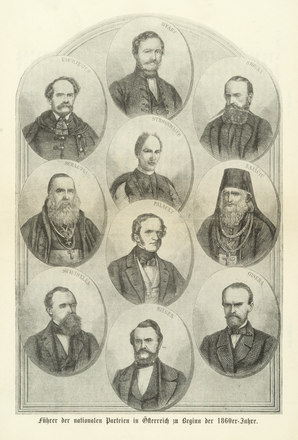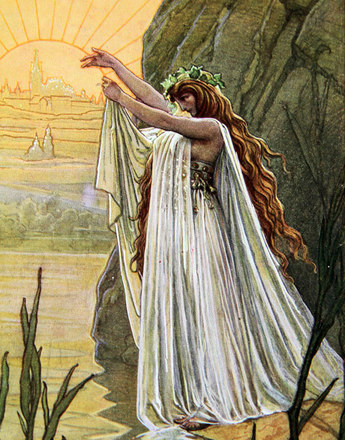Although the concept of the nation needs no explaining to us today, it is in fact a relatively young phenomenon. It was a long and complicated path to the modern understanding of the nation in the sense of a seemingly unquestionable collective defined by a common language, traditions and descent.
‘From humanity through nationality to bestiality’
Franz Grillparzer, Sämtliche Werke. Ausgewählte Briefe, Gespräche, Berichte, ed. Peter Frank and Karl Pörnbacher, 2 vols. (Munich, 1960), vol. 1, p. 500
Even in the medieval and early modern periods people and groups were distinguished from one another in accordance with ethnic characteristics, language or geographical origin; in addition, the inhabitants of a given territory also considered themselves bound together by a real or mythological common past. However, this ‘proto-nationalism’ was also reflected in the feeling of belonging to a certain region or crown: in Bohemia, for example, both the German- and the Czech-speakers saw themselves as subjects of the crown of St Wenceslas, and in Styria both German- and Slovene-speakers were proud to call themselves Styrians. Although these identity-generating factors were at the root of the nationalist idea that developed later, the somewhat vague feeling of belonging to a land was not yet clearly associated with ethnicity.
A further step towards the modern nation was the development of states. From the sixteenth century onwards feudal fragmentation and regional differences in law and administration were superseded by centralizing and unifying tendencies on the part of the new heads of state. The Absolutist ideal was a clearly defined geographical state containing a population with one common language and religious confession.
The end of the eighteenth century saw the disintegration of the traditional patriarchal and feudal societies and the entry of broader social classes into the political process. The Enlightenment led to a weakening of the religiously based view of the world and a general secularization of society as a whole. This paved the way the old world view to be superseded by an ersatz religion in the form of the nation – as yet only understood as the feeling of belonging to a larger group aroused by the fact of common language and ethnicity.
The idea of the modern nation was powerfully boosted by the ideals of the French Revolution, which saw the nation and not the monarchy as the guarantor of the idea of the state in question. In addition, the new concept had an emphatically humanistic and democratic basis in that free citizens were no longer in thrall to the dynastic interests of feudal potentates and were to serve the higher ideal of a common cause.
While the general economic progress that was a feature of the age of industrialization accelerated the propagation of these ideas, it also soon became clear that the process was a two-edged sword, for economic progress brought about a loss of traditional identity and a loosening-up of roots in local communities. As a reaction to this development, the Romantics turned to the quest for genuine, unspoilt roots, which they found in idealized folk cultures and mythical pasts. This new source of inspiration meant that the new nationalism had an inherent contradiction: although it had emerged out of a democratic, emancipatory movement, it was also a conservative reaction to consequences of that same movement.
While the initial emphasis had been on the value of pluralism and the high ideal of the brotherhood of nations, the national communities’ process of self-discovery led them to disassociate themselves from ‘the others’. And the tendency of the nationalities to present themselves as superior to the rest resulted in a way of thinking oriented towards gaining the upper hand. They created defensive ideologies that would appeal to the masses and summed them up in slogans to which the rising nation was sworn to be true. The new ideals revolved around the existence of enemies against whom national possessions had to be defended – as Grillparzer put it in his famous dictum: ‘From humanity to nationality to bestiality’.
Translation: Peter John Nicholson
Kann, Robert A.: Zur Problematik der Nationalitätenfrage in der Habsburgermonarchie 1848–1918, in: Wandruszka, Adam/Urbanitsch, Peter (Hrsg.): Die Habsburgermonarchie 1848–1918, Band III: Die Völker des Reiches, Wien 1980, Teilband 2, 1304–1338
Křen, Jan: Dvě století střední Evropy [Zwei Jahrhunderte Mitteleuropas], Praha 2005
Rumpler, Helmut: Eine Chance für Mitteleuropa. Bürgerliche Emanzipation und Staatsverfall in der Habsburgermonarchie [Österreichische Geschichte 1804–1914, hrsg. von Herwig Wolfram], Wien 2005
-
Chapters
- The birth of nations
- The hierarchy of languages
- ‘Tell me what language you speak and I will tell you who you are.’
- Unity in diversity? The failure of the idea of a ‘greater Austrian’ nation
- The role of history: Concerning ‘historic’ and ‘history-less’ peoples
- The drive for unification
- The role of schools in the growth of national identity



